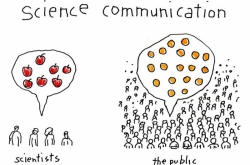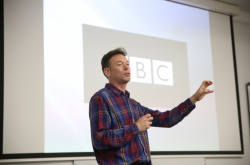Why? What has changed in the past several years?
Several factors contributed to this, and science has become interesting to different parts of the society. On one hand, as technology rapidly develops and is introduced in our everyday life, people start to wonder how they work. On the other, there's the governmental strategies for developing science and popular science in particular, as different states compete for leadership in the high-technology field (a good example of that is the National Technology Initiative in Russia -- Ed.). The third factor that contributes to the promotion of popular science is advertising. As of now, just saying that certain items are better than their counterparts is no longer enough. Let's say there are three cell phone providers in the country - one would have to not just recommend one, but explain why it is better. Same goes with cars. Why is one better than the other? If it's safer, then what provides for it?
These three factors are what drives popular science's development. Universities also play a major role in it, as they are interested in communicating with the incentivized audience and thus try to share more about their work and train specialists in the field of science communication.
So people have started to get interested in science because it has become a part of their everyday lives?
Yes. Also, scientific content and science news are a good distraction. You can suffer from some personal problems, the financial crisis, be sensitive to politics or even bad weather. Yet, you know that in some five years a group of people will go to Mars, and your life becomes more interesting. It's great when there's something more in your life apart from stress, a place where all the news is good ones.
 Lecture at the Open University
Lecture at the Open University
Is there any relation between the growing interest in science and the overall increase in the level of education?
That would be great, though I don't think there is any. It is just that now, many scientific phenomena can be explained in layman's terms. Still, about 85% of N+1's audience are young males from big cities who have higher education or are in process of getting one. Also, there are some people who are simply interested in science.
What are the topics people are now most interested in? Is space exploration as popular as ever?
People are interested in space exploration, as usual: there has been neither a notable increase nor decrease in this topic's popularity. Anyways, we are writing about all kinds of science: technical, natural, social. As in any title, our audience is comprised of many groups: some are interested in chemistry, some - biology, archeology, etc. At the same time, people read pretty much the same amount of texts every time they visit our website.
There are also topics that we've started to write about from scratch. For instance, we are amongst the few who write about mathematics. By the way, there was a peculiar issue: we once wrote about a 10th grader who found a curious mathematical counterinstance to the hypothesis by Danzer and Grunbaum, thus improving the results of a research by one of the previous century's renowned scientists. Mathematicians who've read our article started to discuss the highschooler's work and found several more counterinstances as result.
 N+1 website
N+1 website
How did the format of a popular science news item change? Can one even speak of "science news", or those are rather stories?
Not so long ago, there was no science news at all. For one, there was this news item about whales, who use particular frequencies to communicate with each other - ones that are not used by other cetacea. In Russian social networks, it was published in 2015; yet, it first appeared in 1980 in an American title and then in other media first in 1990, then 2000-s. This is a typical example of science news from the past - and this totally differs from what we are used to perceiving as "news". We can't even imagine that some political or economic news item would be relevant even some couple days after, let alone years.
As of now, we are trying to bring science use to a more casual format. For instance, we are binding some discovery, experiment or results to a particular moment in time - for instance, the publishing of a press release. As for the format itself, we experiment, try different approaches. For now, our news items are quite long texts; apart from describing a particular event or idea, we also explain the context: write why it is important, what was happening in science before that and what happens now.
 Mikhail Gelfand's lecture at ITMO University
Mikhail Gelfand's lecture at ITMO University
Financial and political news are used by many people as a prompt for making decisions; can one say the same about news of science?
I believe people use science news a bit differently, and this also depends on who's reading them. Scientists read them to keep up with what's happening in the scientific community; students use popular science titles when writing their term papers. For others, popular science news presents an opportunity to follow the scientific progress, go in for science or maybe science writing.
At the Baltic Weekend conference, you spoke about the necessity of involving the public into discussions on the ethical problems of the modern technological reality. Yet, to which extent can it be competent in such a field?
It is very important to discuss the future problems related to the introduction of high technologies at the mundane level. What is comfortable for people, and what's not? It is essential to take notice of and mark out the changes that happen, as sometimes, we aren't even aware of them. For instance, when using messengers, we simply don't think that we are using the Internet for it. Our behavior in the real and digital life is different; for instance, my physical and digital entities communicate with the same people differently. Overall, there are many issues we have to discuss, as eventually, legislation that regulates these issues will emerge, and it has to mind the long-standing practices and not break people's habits.

Won't such discussions clam up in the narrow circle of scientists and science writers?
When we started working on our New Ethics project which we use to discuss high-technology future and the related problems and gather an editorial for it, it turned out that most of its members constantly hear common people discuss the same topics in the subway, trains, trams, etc. And these people discuss these issues not because of curiosity, but from a practical point of view. For instance, if a person "likes" your photo in Instagram, what does that mean? If your foe comments on your husband's photos? How should you react to that? Should private information be accessible to intelligence agencies? And what about private correspondence? What are the boundaries of private space? For some people, the changes that happen in relation to high technologies are something normal, and for others, they are still something odd and unnatural. So, the question is: does the society still speak a common language? How different do we become? This is why it is important to involve the general public so as to lay down the tasks and problems we are to solve and discuss them.





